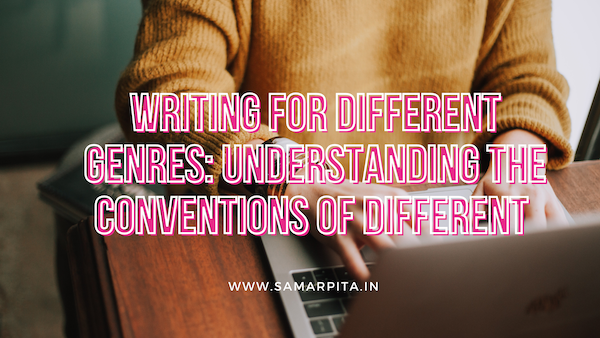Writing is a skill that is essential to communication in virtually all fields and industries. However, different genres and styles of writing require different approaches and conventions. Understanding the conventions of different styles of writing is essential to effectively communicating your message to your intended audience. In this blog post, we will explore the importance of understanding different genres and styles of writing, and provide some tips for how to write effectively in each.
Also Read: Tips for Writing a Memorable Opening Scene
Understand
The first step in writing effectively in different genres and styles is to understand the conventions and expectations of each. For example, a technical report will have different conventions than a novel or a news article. In order to understand these conventions, it can be helpful to study examples of each genre and style. This will give you a sense of the tone, structure, and language that are appropriate for each.
Consider
Another important consideration is your audience. Who are you writing for? What are their expectations and needs? For example, if you are writing for a scientific audience, you will need to use technical language and explain concepts in detail. On the other hand, if you are writing for a general audience, you will need to use clear and accessible language and avoid jargon.
Also Read: Freelance Editing: How to Get Started
Creative V/S Academic Writing
One genre that requires a specific set of conventions is creative writing. Creative writing encompasses a range of styles, including poetry, fiction, and creative non-fiction. In creative writing, the focus is on expressing ideas and emotions through language and imagery. Some conventions of creative writing include using vivid sensory details, creating believable characters, and developing a clear narrative arc.
Also Read: Story Structure: Understanding the Elements of Plot and Narrative Arc
In contrast, academic writing requires a more formal and structured approach. Academic writing is often used in research papers, essays, and dissertations. In academic writing, the focus is on presenting information in a clear and logical manner, using evidence to support arguments. Some conventions of academic writing include using third person point of view, avoiding personal pronouns, and citing sources correctly.
Journalistic Writing
Journalistic writing is another genre that requires specific conventions. Journalistic writing is used in news articles, feature stories, and opinion pieces. In journalistic writing, the focus is on presenting information in a clear and concise manner, while also engaging the reader. Some conventions of journalistic writing include using short, direct sentences, including quotes from sources, and using headlines to grab the reader’s attention.
Also Read: Killing Your Darlings: The Art of Cutting Unnecessary Words
Conventions
Finally, business writing requires a specific set of conventions. Business writing is used in emails, memos, reports, and other types of business communication. In business writing, the focus is on being clear and concise, while also maintaining a professional tone. Some conventions of business writing include using short paragraphs, avoiding jargon, and using bullet points to present information clearly.
In Conclusion
Understanding the conventions of different genres and styles of writing is essential to effectively communicating your message to your intended audience. By studying examples of each genre and considering the needs of your audience, you can tailor your writing to suit the specific requirements of each situation. Whether you are writing creatively, academically, journalistically, or for business purposes, there are specific conventions and approaches that will help you to achieve your goals. With practice and attention to detail, you can become a skilled and effective writer in any genre or style.
This post is a part of #BlogchatterA2Z 2023
***
If you are looking for an excellent manuscript editor, someone to create content for your business, or an expert to help build your personal or professional brand on social media, then look no further and connect with me at editor@samarpita.in I can be followed on instagram at @samarpita and on twitter at @samarpitadotin.
***********
Read my ebook WRITE. EDIT. PROMOTE. to learn the basics about becoming an author – from writing your own book, to editing your first draft, and to promoting your book yourself! You can also read my ebook How To Write A Story Effectively and learn some valuable lessons about how a story can go from average to extraordinary. This book is part 1 of the series.
In fiction, I have two short stories for children in an ebook called Bedtime Stories.


